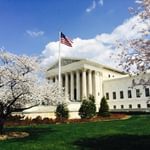
Five years after the U.S. Supreme Court struck down a Texas death sentence when an expert witness had testified that a Black defendant posed an increased risk of committing future acts of violence because of his race, the Court has refused to review another Texas capital case in which the trial court permitted a juror to serve who expressed the very same view.
On April 18, 2022, the Court denied a petition for certiorari filed on behalf of Kristopher Love challenging the trial court’s refusal to remove juror Zachary Niesman from his case. During jury selection in Love’s 2018 death penalty trial, Niesman said he believed members of “non-white” races “tend to be more violent than others.” Love is African American. While claiming he did not harbor any personal animus against people of color and that he could be a fair and impartial juror, Niesman asserted, “Statistics show more violent crimes are committed by certain races. I believe in statistics.”
Texas law requires a capital jury to find that a defendant presents “a continuing threat to society” as a precondition to imposing a death sentence. In February 2017, in Buck v. Davis, Chief Justice John Roberts declared that expert testimony that an individual who is Black has an “’[i]ncreased probability’ of future violence” because of his race injected a deadly “toxin” in the guise of “hard statistical evidence … to guide [the jury’s] otherwise speculative inquiry” into future dangerousness.
“And it was potent evidence,” Roberts wrote, that “appealed to a powerful racial stereotype — that of black men as ‘violence prone.’” The testimony, the Chief Justice continued, “coincided precisely with a particularly noxious strain of racial prejudice, which itself coincided precisely with the central question at sentencing. The effect of this unusual confluence of factors was to provide support for making a decision on life or death on the basis of race.”
Justice Sonia Sotomayor, joined by Justices Stephen Breyer and Elena Kagan, dissented from the Court’s refusal to hear Love’s case. “Over time, we have endeavored to cleanse our jury system of racial bias,” she wrote. “One of the most important mechanisms for doing so, questioning during voir dire, was properly employed here to identify a potential claim of bias. Safeguards like this, however, are futile if courts do not even consider claims of racial bias that litigants bring forward.”
Love’s trial counsel tried to have Niesman removed for cause based on “his stated beliefs that … non-whites commit more violent crimes than whites.” Counsel argued to the court that “leaving this man on the jury would be an invitation to leaving someone on there that might make a decision … that would ultimately lead to a sentence of death on his preconceived notions and beliefs that have to do with the race of the defendant.” The trial judge denied the request without explanation. Although the defense had already used all of its allotted discretionary strikes, as well as two additional strikes granted by the court, the judge refused to grant an additional discretionary strike and seated Niesman on the jury.
Love appealed his death sentence to the Texas Court of Criminal Appeals, which failed to address the merits of his claim. Instead, the state court said that seating Niesman as a juror was harmless, even if it were inappropriate, because the trial court had given Love two extra jury strikes.
The Supreme Court’s conservative supermajority refused to hear Love’s petition for review, eliciting a sharp dissent. Quoting Buck, Justice Sotomayor wrote: “Racial bias is ‘odious in all aspects,’ but ‘especially pernicious in the administration of justice.’ When racial bias infects a jury in a capital case, it deprives a defendant of his right to an impartial tribunal in a life-or-death context, and it ‘poisons public confidence in the judicial process.’ The seating of a racially biased juror, therefore, can never be harmless.”
Sotomayor criticized the Texas court’s decision as “plainly erroneous.” “An already-expended peremptory strike,” she wrote, “is no cure for the seating of an allegedly biased juror. The state court thus deprived Love of any meaningful review of his federal constitutional claim.”
Love’s lawyer, John Tatum, told Law & Crime, “Obviously, I agree with the dissent that our legal system needs to cleanse itself of racial bias in jury selection and stop improperly using harmless error rules to block the application of laws we already have to protect the accused citizen from any racial bias in the application of criminal Justice in this country. There are too many Texas criminal cases where the opinions of the U.S. Supreme Court are either ignored or procedurally nullified.”
In an April 18, 2022 commentary in Slate, senior writer Mark Joseph Stern wrote that the Court’s ruling “illustrates how the conservative majority can change the law by doing nothing.” By “refus[ing] to enforce precedents protecting capital defendants from racial bias,” Stern said, the Court “savi[ed] itself the trouble of formally overruling them.”
Since Buck was decided, two of the justices who made up the 6 – 2 majority in that case — Anthony Kennedy and Ruth Bader Ginsburg — are no longer on the Court and have been replaced by justices appointed by Donald Trump. During the federal execution spree in the final six months of the Trump administration, Stern wrote, “the conservative majority ignored or flouted federal law, often breaking the court’s own rules in the process. They are certain that death row lawyers are using guerrilla tactics to delay executions and are increasingly willing to rewrite law on the fly in a bid to thwart them,” he said.
“What is the easiest way to rewrite the law?,” Stern asked. “Simply stop enforcing it. That’s what the Texas Court of Criminal Appeals did in swatting down Love’s claim, and it’s what SCOTUS did … by blessing the lower court’s defiance of precedent.”
Jordan Rubin, Divided Supreme Court Denies Appeal Over Race, Death Penalty, Bloomberg Law, April 18, 2022; Deborah Gaines, No appeal for Texas death row inmate who murdered Uptown dentist, CBS Dallas/Fort Worth, April 18, 2022; Adam Klasfeld, Justice Sotomayor Says SCOTUS Turned a ‘Blind Eye’ to Racial Bias Claims of Man Sentenced to Die for Dallas Dentist’s Murder, Law & Crime, April 18, 2022; Mark Joseph Stern, A Racist Juror Helped Send a Black Man to Death Row. Why Doesn’t SCOTUS Care?, Slate, April 18, 2022; Adam Liptak, Supreme Court Rejects Case on Juror Said to Harbor Racial Bias, New York Times, April 18, 2022.
Read Justice Sonia Sotomayor’s dissenting opinion.
United States Supreme Court
Oct 18, 2024


